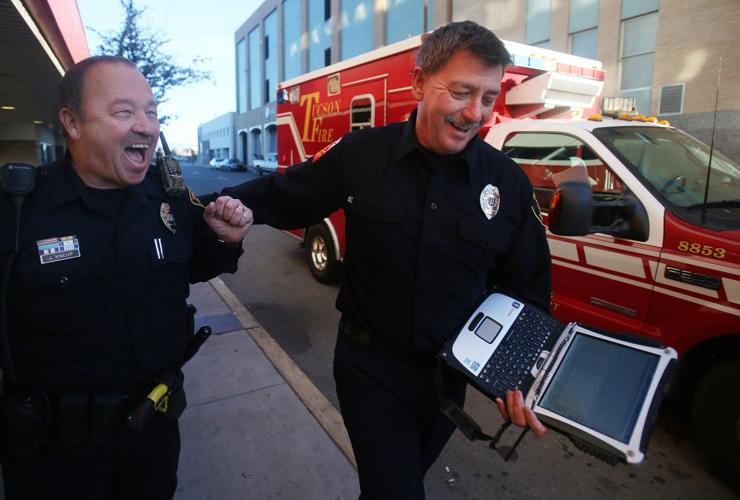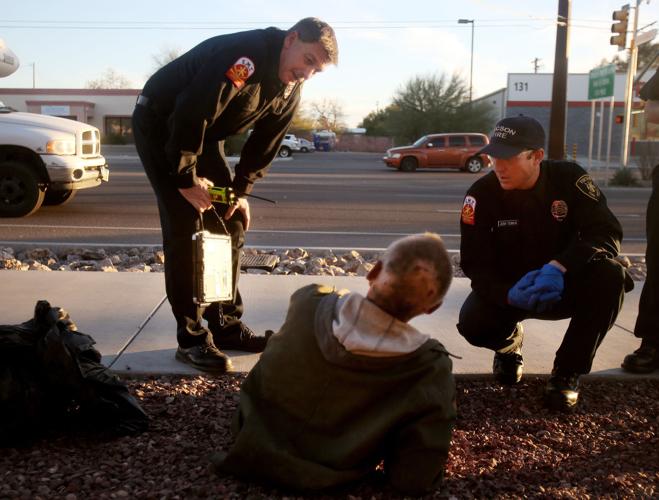The Tucson Fire Department has lost 60 veteran firefighters to retirement since July — an unusually large number for the agency.
Fire Chief Jim Critchley said farewell to 41 firefighters in December alone. Those retirees had a total of more than 1,000 years of experience.
All 60 left the department with more than 20 years of service — the employee who served the longest put in 35½ years.
Crtichley said the department knew about the retirements for five years and took steps starting three years ago to educate and train personnel to fill the vacancies.
“We do have depth in the department and we have prepared for promotions,” said Critchley, adding that services to the public will not be affected.
Promotions will be completed this month, and among those being replaced are an assistant chief, four battalion chiefs and 30 captains. The others are engineers, paramedics and firefighters, the chief said.
Since July, there have been a series of training sessions for recruits at the fire academy. The last class will graduate in February. About 60 are expected to complete the 22-week, paid fire-training program.
Critchley administers a $99 million annual budget and has a staffing of 633 commissioned firefighters and 150 civilian personnel. The department received an $8 million federal grant to help pay the salaries of the new firefighters, Critchley said.
Behind the large number of retirements in 2015, said Assistant Chief Joe Gulotta, is that five years ago the city was in the process of eliminating a medical retirement benefit to employees who did not retire or enter a deferred retirement plan by Dec. 31, 2010.
“That was the driving force for the large number of retirements in December,” said Gulotta. In comparison, he said, “There are only four retirements set for 2016.”
He said many employees chose to enter the Deferred Retirement Option Plan, or DROP. The plan lets public-safety employees stay on the job for an extra five years past their retirement date.
Under DROP, firefighters who are part of the state’s Public Safety Personnel Retirement System and eligible to retire can extend their employment for a maximum of five years. During that period, they don’t collect retirement pay, but the retirement money they would have been paid goes into a fund earning interest, which they collect when they leave.
Meanwhile, they collect their regular pay, plus an extra percentage that would have been their contribution to the state retirement plan.
Critchley, 53, has been with the department for 27 years and chief since October 2011. Each retirement ceremony is emotional for Critchley and the crews who have responded to crashes, shootings and fires alongside their mentors and buddies, he said.
“I worked with and grew up with a lot of these guys,” said Critchley, explaining that he taught at the fire academy for a decade. He was on a team that trained more than 300 firefighters.
Emotional farewells
Eyes swelled with tears and voices cracked Wednesday during the retirement ceremony for Capt. Kenneth Ramsden, 54, who served the community for more than 30 years. He put in his last shift at Station 1 after a celebration attended by about 70 people, including family, friends and fellow firefighters.
Ramsden was presented with city and department commemorative awards, and an ax mounted on a large wooden plaque. “I feel privileged to have worked with you,” said firefighter Josh Temkin. He said the captain dedicated his life to the job, and “put the patient first and made sure the crew did the job.”
Battalion Chief James Kearney shared stories about how Ramsden gathered firefighters to volunteer on their days off to help people in need whom they met during calls.
Among the stories were when buddies paid for materials to build a ramp for a quadriplegic, install a heater in the house of a 100-year-old woman and resurface a bathroom floor for another centenarian.
Ramsden also gathered his men to volunteer, alongside hundreds of others, to build a house for Roxanne Warneke in Avra Valley. Her husband, William Warneke, was one of 19 Granite Mountain Hotshots who were killed in 2013 battling the Yarnell Fire near Prescott.
It is during these times, and the response to 85,000 medical and fire calls a year, that firefighters build a camaraderie that doesn’t end.
“I lived my dream,” said Ramsden. “I wanted to be a firefighter since I was a little kid.” Above all, he said, he treasures friendships built over the years at the firehouse.
Critchley thanked Ramsden for his “outstanding service,” mentioning how their paths crossed repeatedly over the decades.
“Some of the retirements are harder than others, and you are one of the hardest because we have been through so much,” said Critchley.
“I appreciate everything you helped me understand. I appreciate your friendship.”





